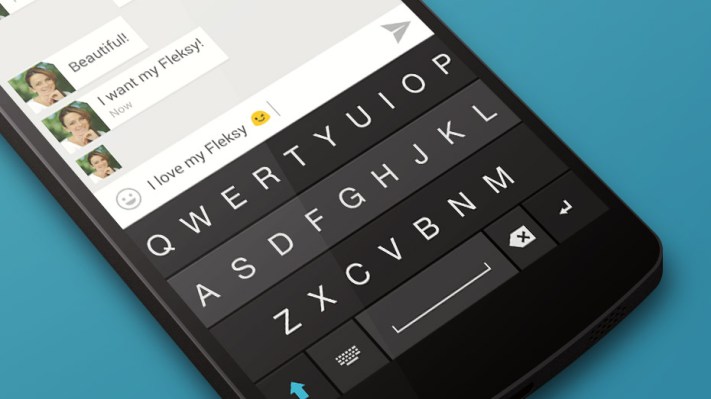San Francisco-based Fleksy has launched its in-app SDK integration for iOS via four new partners who implement the software in their own apps today. These include Launch Center Pro, Wordbox, GV Connect and BlindSquare, and were chosen from a number of potential partners to help Fleksy demonstrate the power and range of its virtual keyboard.
Operating on iOS as a replacement for a default system component like the keyboard is not an easy task; Apple will not allow third-party devs to replace some system features like the keyboard, browser, messaging or calling app in the same way that users can do so on Android. Fleksy is attempting to get around this limitation by providing an SDK that third-party devs can use to build Fleksy into their own apps one at a time, in much the same way that Google makes it possible for devs to build in an option to have their software open links in Chrome on iOS.
These four launch partner apps are all available right now in the App Store, and take advantage of Fleksy’s unique ability to interpret a user’s intended input regardless of where they strike on the screen to different ends. Fleksy co-founder and COO Ioannis Verdelis explained to me the selection process for this first batch of apps in an interview.
“We’ve had a lot of interest [from third-party devs] really since our first release of the app on iOS,” he said. “We’ve picked four partners who worked with us through the beta process of the SDK, and we’ve tried to have one app that addresses the accessibility market, BlindSquare, and then we picked other popular apps that we think have meaningful use of text input in their design.”
GV Connect is a Google voice client where you can use Fleksy to send SMS messages; Wordbox is a text editor; and Launch Center Pro is “a bit of everything,” says Verdelis, with shortcuts that help people navigate iOS and get things done quicker. For these first four partners, he notes that it was important not just to get partners who would use the keyboard in interesting ways, to help showcase the possibilities for others, but to use people who helped define the product, too.
From here, Fleksy intends to continue to be selective about SDK partners and work with third-party devs to launch their integrations for a little while, but eventually the plan is to open it up for anyone to use independent of Fleksy’s involvement. Revenue for Fleksy differs depending on how each dev makes their revenue, Verdelis says, with some like Launch Center Pro trying things like offering it up as an in-app purchase and then sharing revenue from those sales, and others going for a more straightforward licensing fee.
Fleksy launched as a standalone third-party keyboard on Android out of beta last week, and Verdelis says they’ve racked up over 100,000 downloads since then. On iOS, they’ve had over 500,000 since launching their standalone app, but the SDK is the focus here in terms of business targets, so watching to see how the stable of Fleksy-using apps grows from here will be key.
